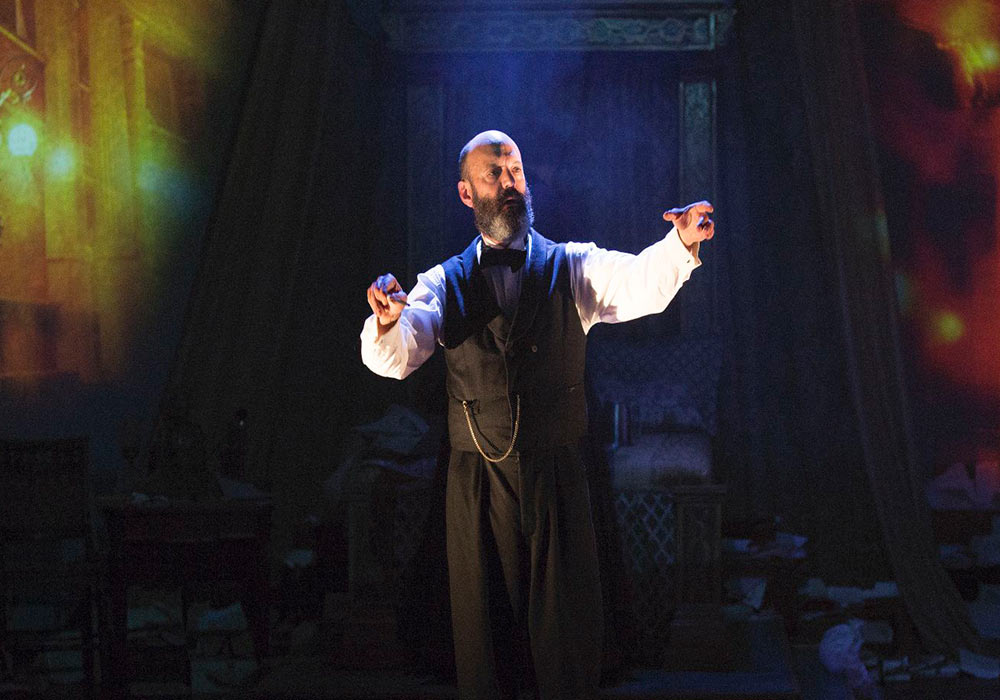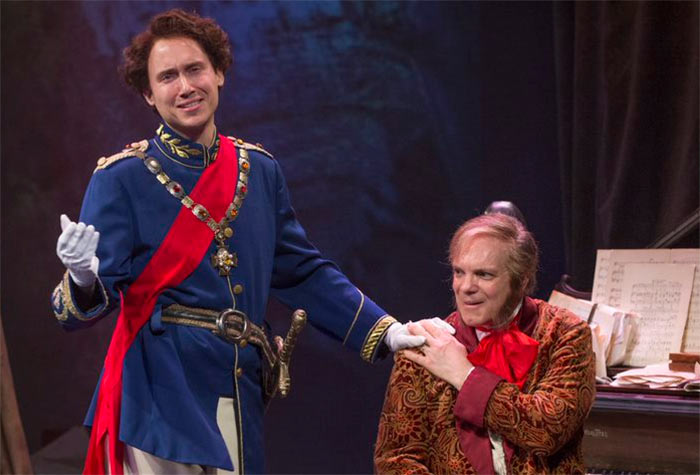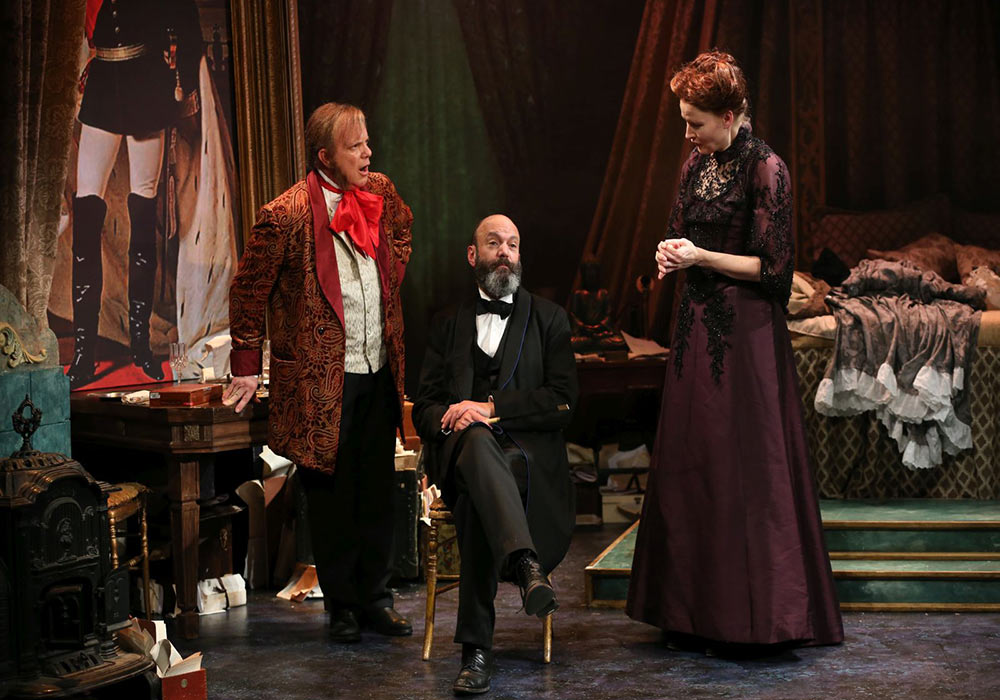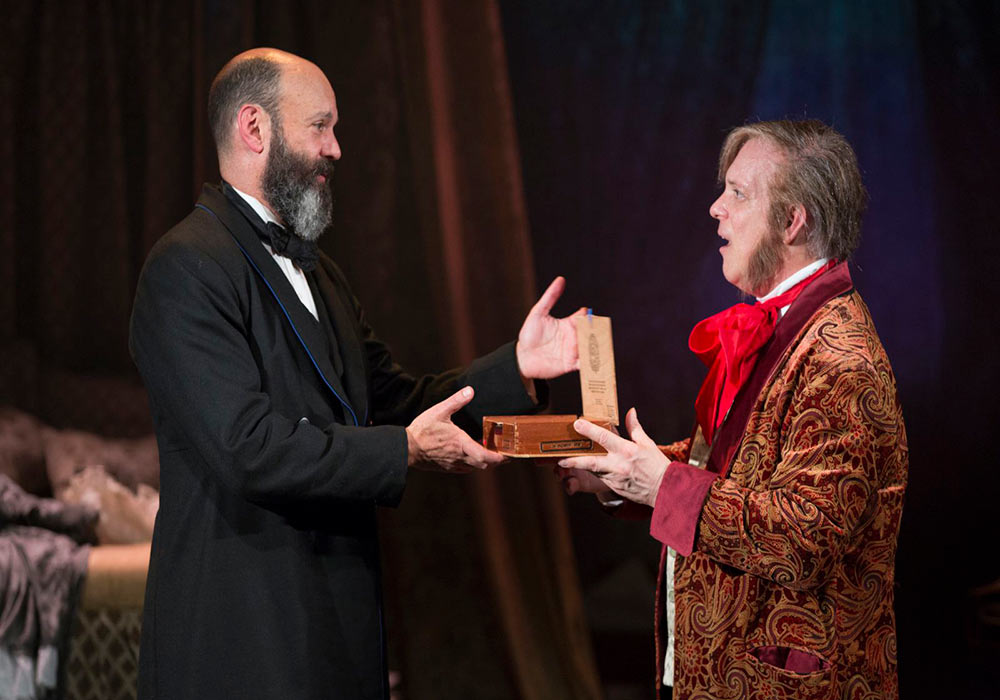My Parsifal Conductor. A Wagnerian Comedy

Allan Leicht, My Parsifal Conductor. A Wagnerian Comedy. Play in two acts, directed by Robert Kalfin. World Premiere, opened on 10 October 2018 and runs until 3 November. Performed at the Marjorie S. Deane Little Theater at West Side YMCA, New York City. 2 hours and 10 minutes. See promo video here!
Cast: Cosima Wagner (Claire Brownell), Richard Wagner (Eddie Korbich), King Ludwig II of Bavaria (Carlo Bosticco), Herman Levi (Geoffrey Cantor), Friedrich Nietzsche (Logan James Hall), Dora (Alison Cimmet), and Sophie/Carrie Pringle (Jazmin Gorsline).

Photo: Carol Rosegg
This play was written by the American/Israeli playwright and screenwriter, Allan Leicht, an Emmy Award and Writer’s Guild Award winner, son of Florence Schechter Leicht, a Yiddish actress. For many years, Leicht has been attracted by the legacy of the Yiddish language and culture as part of the Jewish identity. During his intellectual journey, Leicht was surprised to find that some of Richard Wagner’s best friends were Jews, in spite of his anti-Semitism. And even more surprising was that his masterpiece, Parsifal, a “sacred Christian work,” that Wagner called his “last card” and that was the pinnacle of his career, was conducted by a Jew, Hermann Levi, whose ancestors included twelve Rabbis. “I am Wagnerite, with all the doubt and enjoyment that comes along with it. In Richard Wagner we learn that genius can have its dark side; in Wagner’s case, the dark side was anti-Semitism and also an insatiable libido (or maybe that was his light side): a great amoral artist torn emotionally by every religion of which he was aware. But that music! That music! As our character of Hermann Levi says in the play, ‘How blithe we Jews are to judge men by their music,’” said Leicht in an interview to The Wagnerian. Among the numerous essays about this masterpiece, one the best is William Kinderman’s, Wagner’s Parsifal (2013).
Everything in Wagner, and about him, is controversial and full of paradoxes. In the history of art, there has never been such an artist who has been so adored by his passionate followers and so hated by his detractors. Stewart Spencer properly affirms that “the demonization of Wagner started even as the first calls for his canonization were being considered” [Wagner Remembered, 2000]. As time passes, we know more in detail about every aspect of Wagner’s life and we find more arguments to support one view over the other. We are accustomed to hear references to “Wagnerism,” and “Wagnerites,” but we never see the use of terms such as Mozartism, or Beethovenism. We have also witnessed similar opposite views among Wagner’s own grandsons. And even more paradoxical is his Parsifal, an opera that presents the journey of a “pure fool” who gains knowledge and wisdom from love and compassion and then promotes peace and conciliation; nevertheless, Parsifal is one of his most controversial operas. Not surprisingly, Wagner has been called indistinctly, “the sorcerer of Bayreuth,” “the terrible man and his truthful art,” “the Rabbi of Bayreuth,” “an intellectual pantophagist,” “the father of dragons,” and “the Monster of Bayreuth.”

Photo: Carol Rosegg
In addition to his narcissism, extravagant life and his excesses in private life, perhaps the most publicized of the numerous controversies about Wagner has been his extreme nationalism and his hostile views about Jews. Anti-Semitism was common place in the 19th century cultural European environment, particularly among left-wing revolutionaries. In 1850, Wagner wrote an anonymous pamphlet, Jewishness in Music, and a decade later, he revised and published a stronger version under his own name. “At the time, it was part of the psychological make-up of a European nationalist (not only a German one) to be anti-Semitic,” affirms Daniel Barenboim, and he also explains that “the Nazis’ appropriation of Wagner’s anti-Semitic prose transformed him retrospectively into the prophet of their ideology” [Daniel Barenboim, Music Quickens Time, 2008]. Paradoxically, before Wagner became taboo, the Budapest-born, Theodor Herzl, founder of modern Zionism, was enraptured by Wagner’s music, and it has been documented that Herzl wrote his manifesto, The Jewish State (1896) after attending a performance of Tannhäuser in Vienna; in 1898 he ordered the “Fantasie” from Tannhäuser to be performed at the Second Zionist Congress in Basel, after obtaining permission from Cosima Wagner.
It should also be mentioned that when Hitler began attacking Jewish musicians, violinist Bronislaw Huberman organized a rescue operation to move these musicians to Palestine, which was at the time under British rule. He received strong support, particularly from Arturo Toscanini, who in 1933, refused to conduct in Bayreuth as a sign of protest against fascism. Huberman then founded the Palestine Symphony Orchestra, which later became the Israel Philharmonic Orchestra in 1948. Toscanini conducted the first concert on 26 December 1936, and at the second one, he included Wagner music in the program. In late 1938, the Orchestra initiated a boycott against Wagner; since then, Wagner’s music has been banned in Israel … a similar behaviour to the Nazis’ prohibition of playing the music of Jewish composers.
[This fascinating story has been narrated in a documentary film, Orchestra of Exiles, directed by Josh Aronson, 2012].
In Parsifal, almost at the end of the first act, there is a moment when Gurnemanz explains to the “pure fool:” “here [in this Holy place] time becomes space.” Analogously, Leich’s play takes place in a room full of memories. A place where five strong characters enter and exit in different moments of the time spectrum (50 years), as if time was becoming space, trying to negotiate or to reconstruct their past negotiations about who should conduct Parsifal, the last composition of Richard Wagner. In addition to Wagner, the play includes his wife Cosima, King Ludwig II of Bavaria, Hermann Levi, Friedrich Nietzsche, two maids, and the young soprano Carrie Pringle.
The protagonists and the events presented in the play are based on historical and well-known facts, although the author took some “poetic liberties” to enhance the intensity of the narrative or to include others whose veracity has been bitterly disputed, or may have never happened. Many members of the audience found this offensive, gross or cruel, while others saw it as very funny and enjoyed their presentation in the theatrical tradition that explains “se non è vero, è ben trovato” (even if it is not true, it is well conceived’). A peculiar way to deal with anti-Semitism is to present it in a farcical and comic way to make its absurdity more obvious as Leitch clarifies, “comedy is based on incongruity.” That was the path also followed by Chaplin in The Great Dictator, Mel Brooks in The Producers, and Ken Russell in Lisztomania.
The play opens around 1930, with the 92-year old Cosima hallucinating and close to death. She sees “angels” in the audience, heralding the appearance from Heaven of her adored husband who tells her about her father Franz Liszt, Hermann Levi, and other friends who are keeping him good company in Heaven. “In Heaven? A Jew? In Heaven? Jews? Many?” exclaims Cosima. To which Wagner responds, “Not nearly as many as there seem to be, of course. And, like everywhere, prominent, very prominent. Totally powerless, but disproportionally influential.” Herman Levi, Chief conductor of the Munich Court Opera was a close friend of Johannes Brahms and Clara Schumann before deserting them to become Wagner’s favorite conductor. Levi was admired for his artistic skills and in recognition of his devotion to Wagner he was invited to be a pallbearer at Wagner’s funeral.
Parsifal was conceived as a “sacred Christian work” and the Festpielhaus in Bayreuth was intended to be the ideal setting for its performance. Because the financial negotiations stipulated that Wagner should use the Munich Orchestra and chorus, including its conductor, the Wagners, particularly Cosima, were opposed to having Levi as the conductor, as she exclaims: “Twelve rabbis conducting Parsifal!” A major point of historical dispute has been the multiplicity of tactics and tricks that were used to substitute him, and, if he was selected, the next impossible job was how to convince him to convert to Christianity to prevent a revolt from the traditional Wagnerites. In one of the attempts to Christianize him, Wagner pours water over his bald head …an episode described by Levi in these terms: “Today is Conflict Resolution Day and if we have learned anything about resolving religious disputes, it’s that throwing water on your conductor in an attempted baptism is going to leave you with a ‘wet Jew.’”
As narrated by Cosima in her Diaries, in the summer of 1882, Levi was at Wahnfried and on June 29, Wagner showed Cosima, with “lively merriment” an anonymous letter accusing Levi of having an affair with her and warning Wagner that a Christian work should not be contaminated by a Jewish conductor. With similar merriment, Wagner showed the letter to Levi, who was so offended that he left Bayreuth the next day. Wagner begged him to come back in a letter (July 1) … “lose nothing of your faith, … in any case, you are my Parsifal conductor.” There has been a lot of speculation as to whether Nietzsche was the anonymous author of the letter. Levi returned, and conducted the premiere of Parsifal at the Bayreuth Festival on 26 July 1882; at the last of the sixteen performances, Wagner took the baton from Levi at the final transformation scene, and conducted to the end. Levi continued to conduct Parsifal on many more occasions, until 1894, including various private performances for King Ludwig. Richard Strauss, who was among the ardent anti-Semite defenders of Wagner’s art, went to the premiere and expected to replace Levi as early as 1891; when he knew that Levi was not to be removed, he reacted saying: “Thus poor Parsifal will not be released from the Jewish torture chamber;” but his dream was granted when he was invited to conduct it in 1933 and 1934. The play ends on a positive tone, when Cosima, after reviving all the events remembered in a sparse 135 minutes, begs the “angels” to accept her in Heaven, as they have also accepted the other now “petrified” characters; she asks “Friend Levi? Do you think I am anti-Semite?” and he responds, “You, Cosima? What a question. Yes.” And Cosima insists “I don’t mean any harm.” To which, Levi says “I’m sure you don’t; but don’t worry, Cosima, some of my best friends are anti-Semites. And some of them are Jews. You don’t have to be a gentile to be an anti-Semite.” Recovering her peace before dying, she addresses him, saying, “You are my Parsifal Conductor.”
The cast members are superb, talented, convincing and very closely matched to the physiognomy of the original characters. Among them, Claire Brownell in the role of Cosima was the outstanding protagonist as she vividly expressed her changing views about Levi. Geoffrey Cantor’s Levi made a convincing personification, distilling simultaneously all his inner suffering, his passion and admiration for Wagner, and his own religious convictions. Veteran Eddie Korbich also brought Wagner’s exuberant and extravagant personality very close to all the accounts we have about him. Carlo Bosticco also made a very good performance of the mad King Ludwig, entering from and going back through his human size painting. The mentally disturbed Nietzsche was also well conveyed by Logan James Hall through short and multiple appearances without making his points clear and showing signs of insanity. The scenic design provided a very good background for the characters. In spite of space limitations, they were able to accommodate all the action. The costumes were also of high quality, not only the colorful royal attire of King Ludwig, but particularly Cosima’s changing outfits, from a lovely evening gown, to being covered by a nightgown.
On Thursday, 18 October, 2018, the performance was followed by “Talk Back” session, hosted by Hilan Warshaw (Director of the documentary Wagner’s Jews, 2013). It was joined by the playwright Leicht, the Director, veteran Robert Kalfin and the entire cast. It was a very animated dialogue between them and the enthusiastic audience. Leicht began by affirming, “I love the music, I don’t like the man.” When asked about the veracity of many of the punch-lines of the play, Leicht explained that he spent several years reading, consulting and exploring a large variety of sources about Wagner’s life, but, as he said in The Wagnerian interview mentioned above, “plays do not require footnotes.” The audience and the cast members confirmed that the central character of the play was Cosima and that the hero was Hermann Levi. This top-notch play will delight anyone interested in Wagner and his paradoxical relationship with Judaism. It is hoped that the text will be printed and the play recorded to make it available to larger audiences.

Photo: Carol Rosegg
Very interesting reviews of the play can be found in Alice Burdick Schweiger (The Jewish News, October 4, 2018) and Jonathan Mark, “Some of Wagner’s Best Friends Were Jews” (The New York Jewish Week, October 9, 2018)
Photos: Carol Rosegg
Promo Video: My Parsifal Conductor. A Wagnerian Comedy
Reviews and articles by Germán A. Bravo-Casas on Wagneropera.net
My Parsifal Conductor reviewed by Germán A. Bravo-Casas, Richard Wagner Society of New York
Wagner’s Dream. A documentary film directed by Susan Froemke and edited by Bob Eisenhardt
William Kinderman: Wagner’s Parsifal
Wagner recordings
Germán A. Bravo-Casas recommends Wagner recordings



